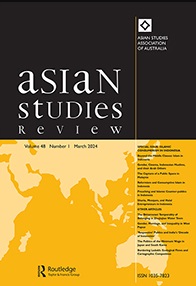
Theara Thun & Duong Keob
in Asian Studies Review
Abstract: This article demonstrates that precolonial Khmer ethnicity played an essential role in the Cambodian court’s relations with those of Siam and Vietnam in the mid-19th century because Cambodia’s ruling elite and religious leaders often adopted ethnic politics in relation to the Khmer to resist threats that the neighbouring courts imposed on them. Developed as ‘ethnocentrism of victimhood’, which integrates real or imagined depictions of external influence with anxieties about the extinction of an ethnic community, this primordial ethnic conception was transformed under French rule and became crucial in the rise of nationalism during the early 20th century. The colonial encounter superimposed on the precolonial conception of ethnic identity by inserting the notion of racial superiority into it, thus worsening Khmer–Vietnamese relations. Newly emerged components such as national borders and history, along with socio-political factors, were crucial in restructuring ethnicity under colonial conditions. The notion of being a victim of someone else’s abuses had a long-term impact on forming and stimulating ethnic antagonism among ethnic Khmers. This analysis thus reveals the role played by primordialism and constructivism in reformulating modern ethnicity and nationality, and why ethnic antagonism toward the Vietnamese emerged among the Khmer.
About the author: Theara Thun was a NUS-HYI Joint Doctoral Scholar from 2012-16.
